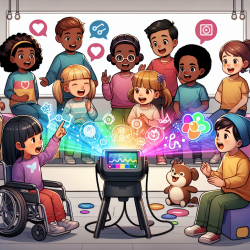Unlocking the Power of Interpersonal Communication in Special Education
In the realm of special education, effective communication is not just a skill—it's a necessity. Drawing insights from the research article titled "Interpersonal communication as an agent of normative influence: a mixed method study among the urban poor in India," we can glean valuable lessons applicable to special education practices. This study, conducted by Rimal et al., explores the significant role of interpersonal communication in influencing behaviors and decisions within communities, particularly in the context of family planning among the urban poor in India.
The Role of Interpersonal Communication
The study highlights how interpersonal communication acts as a catalyst for normative influence, shaping behaviors through social interactions. In special education, this concept can be translated into fostering a collaborative environment where educators, therapists, parents, and students engage in open dialogues. By encouraging discussions, we can create a supportive network that enhances educational outcomes for students with special needs.
Lessons for Special Education Practitioners
Here are some actionable insights from the study that special education practitioners can implement:
- Foster Open Communication: Encourage regular communication between educators, therapists, and parents to share insights, progress, and challenges. This collaborative approach ensures that everyone is aligned in supporting the student's educational journey.
- Build Community Norms: Create a culture of inclusion and acceptance within the school community. By promoting positive social norms, students with special needs can feel more integrated and supported.
- Leverage Peer Influence: Utilize peer support systems where students can learn from each other. Peer interactions can serve as powerful motivators for behavior change and skill development.
- Enhance Parental Involvement: Engage parents in meaningful conversations about their child's progress and involve them in decision-making processes. Parental support is crucial in reinforcing positive behaviors and educational strategies at home.
Encouraging Further Research
While the study provides valuable insights, it also opens avenues for further research in the context of special education. Practitioners are encouraged to explore the following areas:
- Impact of Cultural Norms: Investigate how cultural norms within diverse communities influence the educational experiences of students with special needs.
- Role of Technology: Examine how digital communication tools can enhance interpersonal communication and collaboration in special education settings.
- Longitudinal Studies: Conduct longitudinal studies to assess the long-term impact of interpersonal communication strategies on student outcomes.
Conclusion
The findings from the study by Rimal et al. underscore the transformative power of interpersonal communication in shaping behaviors and decisions. By applying these insights to special education, practitioners can create a more inclusive and supportive environment for students with special needs. To delve deeper into the original research, please follow this link: Interpersonal communication as an agent of normative influence: a mixed method study among the urban poor in India.










